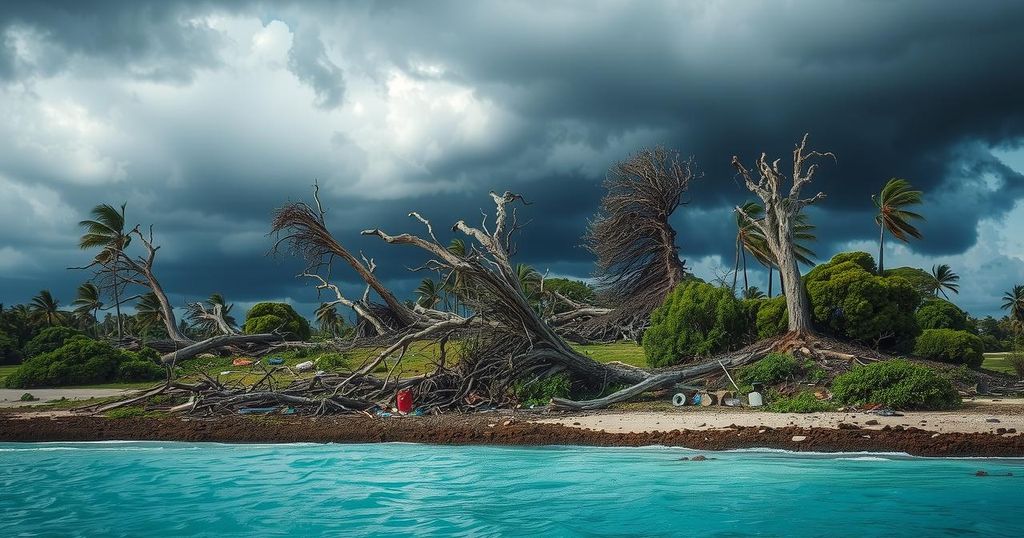Cyclone Chido and Vanuatu Earthquake: A Call for Urgent Disaster Response
Tropical Cyclone Chido caused extensive destruction in Mayotte, Comoros, and Mozambique, followed by a 7.3-magnitude earthquake in Vanuatu. Direct Relief coordinates emergency responses, providing crucial medical supplies and support to these impacted regions. The disasters pose various long-term health risks to affected communities, emphasizing the need for ongoing assistance and disaster preparedness.
Over the weekend, Tropical Cyclone Chido caused severe destruction across the Mayotte archipelago, Comoros, and Mozambique. Just days later, a magnitude 7.3 earthquake struck Vanuatu, exacerbating the situation for communities already in crisis. Chido is noted as the most formidable storm to impact Mayotte in over nine decades, with winds exceeding 140 mph and storm surges reaching 28 feet. The current death toll in Mayotte stands at 22, but casualty estimates are expected to escalate as further assessments occur.
Cyclone Chido inflicted similar destruction in Comoros, where extensive damage prompted President Azali Assoumani to declare a week of mourning. Mozambique, which was already susceptible to severe weather impacts, experienced wind gusts above 160 mph and torrential rains. Such forces exacerbated the vulnerability of the local infrastructure, devastating homes and health facilities.
Direct Relief is actively evaluating the needs of the affected regions. In Mayotte, collaboration with French emergency agencies is focused on addressing immediate healthcare requirements. In Comoros, Direct Relief is liaising with Santé Diabète to assess and provide necessary support. Efforts in Mozambique include outreach to the Ministry of Health, offering vital emergency supplies as damage assessments continue.
Meanwhile, Vanuatu experienced widespread devastation due to a 7.3-magnitude earthquake with ongoing assessments indicating significant damage to homes and healthcare infrastructure. Direct Relief is engaged with local healthcare partners to address urgent needs, including a scheduled shipment of emergency medical supplies. Disasters like these inherently threaten human health, resulting in mass casualties, trauma, and stressed health systems.
The aftermath presents additional health risks, such as disease outbreaks from contaminated water, forced displacement to overcrowded shelters, disruptions of chronic care, and jeopardized maternal and infant health services. In response, Direct Relief is dedicated to ensuring essential medical provisions reach frontline healthcare workers.
Direct Relief has a longstanding commitment to disaster response, delivering crucial medical supplies during past calamities. Following Cyclone Idai in 2019, the organization provided over 100 tons of aid to Mozambique, Zimbabwe, and Malawi. It has also been instrumental in supporting Vanuatu’s health systems, responding effectively to emergencies arising from both cyclones and earthquakes.
Substantial medical aid shipments followed other recent earthquakes such as Türkiye and Syria, as well as to the Bahamas after Hurricane Dorian. Direct Relief prepositions medical supplies in at-risk areas globally, ensuring accessible care during emergencies. Presently, the organization remains committed to supporting healthcare providers impacted by Cyclone Chido and the Vanuatu earthquake, facilitating recovery efforts, and providing life-saving assistance to those in dire need.
While donations are not obligatory, the contributions made by such entities emphasize the extraordinary support within communities.
The article pertains to the significant devastation caused by Tropical Cyclone Chido across multiple regions, particularly Mayotte, Comoros, and Mozambique, followed closely by a serious earthquake in Vanuatu. These natural disasters have resulted not only in immediate losses of life and property but also pose long-term health risks to affected communities. Organizations like Direct Relief are crucial in providing emergency assistance and ensuring healthcare systems can manage the ensuing crises.
In summary, Cyclone Chido and the recent earthquake in Vanuatu exemplify the critical vulnerabilities communities face during natural disasters. The impacts extend far beyond immediate destruction, leading to compounded health risks. Direct Relief’s ongoing efforts highlight the importance of early engagement with healthcare providers and the timely distribution of essential medical supplies. Such proactive strategies are pivotal in aiding recovery and reducing the consequences of future disasters.
Original Source: www.directrelief.org




Post Comment